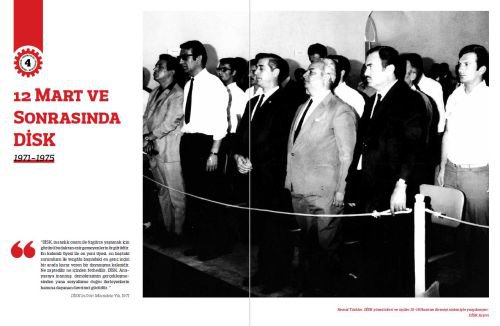*Photos: From the book "DİSK Tarihi" (History of DİSK)
The history of labor unions in Turkey dates back to 1947, when the one-party period had just been over. With the Law on Unions passed and enacted by the Parliament on February 20, 1947, employers and workers were, for the first time, granted the right to unionize in Turkey. [1]
On February 13, 1967, 15 years after the Confederation of Turkish Trade Unions (TÜRK-İŞ) emerged as "the first nationwide union organization", the Confederation of Progressive Trade Unions of Turkey (DİSK) was founded as an "independent and democratic class-based organization."
As pointed out by Oya Baydar in her 1998 book, the notions of "class" and "class struggle", which had long been rejected by the TÜRK-İŞ, became a part of the movement of unionism in Turkey thanks to DİSK. [2]
Since then, the confederation has weathered quite a lot of storms in its over 50 years of history: Its Founding Chair Kemal Türkler was assassinated on July 22, 1980, a few months before the military coup on September 12; after the coup, its activities were halted for 11 years, its entire property was confiscated by a decree, its 67 executives were arrested and 78 people faced capital punishment in a 1,477-defendant trial...
With such a long and difficult past behind and still facing numerous hardships together with the working class, DİSK has memorialized its years-long contribution to Turkey's labor movement with a recent book entitled "The History of DİSK: Establishment, Resistance, Existence (1967-1975)". [3]
Even though the book, or rather its first volume, is unfortunately only in Turkish, at least for the time being, it is still worth taking a closer look at how the idea of writing a detailed history of the DİSK first came up, why this historiography is so important for the confederation, what one should expect to find in this first volume and in the ones that are soon to follow.
Briefly about the first volume

*Front and back covers of the first volume
As hinted above, the book with the subtitle "Establishment, Resistance, Existence (1967-1975)" is, in fact, only the first volume of a more comprehensive work on the history of the confederation.
Covering both the path leading to the establishment of the DİSK and its struggles in its first years, this 704-page volume was prepared by the DİSK Research Center (DİSK-AR) and edited by Aziz Çelik, an Associate Professor from Kocaeli University Department of Labor Economics and Industrial Relations who is specialized in unions and work life.
The first volume of the "DİSK History" was finally published in printed form in February 2020. It is also possible to read and download the book free online on the official website of the confederation.
How did the idea come up? Why so important?
Founded in 1967, DİSK might have only 50 years of history, but it situates itself within the 150-year labor history of Turkey, which also covers the late-Ottoman era. It also attaches great importance to the collective memory of the working class and passing this memory to next generations.
According to DİSK, the loss of an organization's historical memory will also lead to a loss of its identity. Within this context, the "Introduction" part of the book signed by the DİSK Executive Board explains why writing a comprehensive history of the DİSK is so important for them:
"With a history of more than  half a century, the Confederation of Progressive Trade Unions of Turkey (DİSK) is a labor organization which has its roots in the 150-year working class struggle of Turkey.
half a century, the Confederation of Progressive Trade Unions of Turkey (DİSK) is a labor organization which has its roots in the 150-year working class struggle of Turkey.
"Our organizational history as well as the experience and knowledge of Turkey's working class struggle shed light on the present of DİSK. The history of DİSK is the story of hundreds of thousands of workers, thousands of unionists and daredevil people. This history has been forged with courage and power of the mind.
'DİSK has weathered so many storms...'
"During its struggle for over 50 years, DİSK has weathered so many storms. There were those who gave DİSK only a certain amount of time to live, those who wanted to destroy the DİSK and the ones who wanted to close it.
"Workers who were members of the DİSK and resisted for their rights were shot. Kemal Türkler, the Founding Chair of the DİSK, was killed in an ambush. DİSK's 2nd Chair Abdullah Baştürk and DİSK executives were kept in prison for years, tortured and faced capital punishment. DİSK was unlawfully and forcibly prevented from working for 11 years. Putschists wanted to confiscate DİSK members and its property.
'No identity without memory'
"We, as the Executive Board of the DİSK, believe that it is of considerable importance to pass on DİSK's over 50-year history of struggle to next generations and to ensure that DİSK's history is known.
"If historical memories of organizations disappear, their identities disappear as well. We attach great importance to the continuity of the DİSK's memory of struggle and experience."

*During June 15-16 Great Worker Resistance in 1970
Preparations started in 2016
While the confederation finds it vital to pass the DİSK's memory of struggle and experience to next generations within the wider labor history of Turkey, it was ahead of its 50th establishment anniversary in 2017 that the DİSK realized that there was a lack of a comprehensive work on the history of the DİSK penned by the confederation itself.
In the "About Our Book" chapter of the first volume, Editor Aziz Çelik explains how the idea of writing a history of the DİSK first came up:
"With the aim of eliminating the lack of a comprehensive work on the history of DİSK, the idea of preparing a book on the DİSK history was brought up within the frame of DİSK's 50th establishment anniversary works. The preparations for the book that aims to document the DİSK history based on primary sources and documents started in September 2016."
'It is not an "official history"'
On the other side, in introducing the book, Editor Çelik stresses a certain point which I personally find quite important. As he underlines, the "DİSK History" book is not intended or prepared as an "official history" which lays an emphasis on achievements while brushing aside failures:
"Another problem about writing the history of an organization is the approach that can be called 'official' historiography.
"A historiography where only achievements, gains and victories are written while mistakes, shortcomings and failures are hidden or covered up will be an injustice to history and it will also be no use for today.
"The DİSK History, the first volume of which you are holding in your hands, is a union/organizational work of history, but not an 'official history.'
"In writing the history of the DİSK, not only achievements, gains and victories, but shortcomings, mistakes and missteps have also been put forward. This work covers controversial actions and decisions taken in the past as much as it covers the success stories."
An excerpt from the back cover"The book in your hands is the first volume of a work that aims to document DİSK's more than 50 years of struggle and experience based on primary sources in a comprehensive and objective manner. If historical memories of organizations disappear, their identities disappear as well. The DİSK History book aims to bring DİSK's memory of struggle and experience to today and tomorrow. Prepared by using original archival resources, thousands of documents, publications and photographs, the book aims to fill an important gap in the history of the DİSK and the working class of Turkey." |
The structure of the first volume
Again in the "About Our Book" chapter of the first volume, Editor Aziz Çelik briefly explains what we should expect to find in this very first volume:
"The developments that unfolded from 1967, when the DİSK was established, to May 1975, when the 5th General Assembly convened, have been addressed in the first volume in such a way that the developments in the pre-DİSK period have also been included.

*1st chapter: The Path Leading to DİSK
"The period covered by the 1st volume of the DİSK History book is the DİSK's years of establishment, resistance and existence. The 1st volume of the book consists of four chapters. The 1st chapter is entitled the 'Path Leading to DİSK' and offers snapshots from the struggle of the working class of Turkey from the late Ottoman period to the 1960s.

*2nd chapter: Establishment
"The 2nd chapter is entitled 'Establishment' and elaborates on the establishment process of the DİSK (1966-1967).

*3rd chapter: Existence and Resistance
Entitled 'Existence and Resistance (1967-1970), the 3rd chapter covers the period from the establishment of the DİSK to the June 15-16 resistance.
Briefly about June 15-16, 1970June 15-16, 1970 mark the "Great Worker Resistance" of Turkey. These two days are considered one of the cornerstones of the labor movement and unionism in the country. The process leading up to the incidents of June 15-16 was triggered by a legislative proposal and its approval by the Parliament. In 1970, the Republican People's Party (CHP) and the ruling Justice Party (AP) prepared law drafts foreseeing amendments to the Law no. 274 on Unions and the Law no. 275 on Strike and Lockout. These two law drafts were then combined into a single legislative proposal at the commission and referred to the Parliament to be debated and voted. This proposal which supposedly aimed to "create a powerful unionism" foresaw restrictions on unionization and right to strike and would, in practice, make it harder for workers to leave TÜRK-İŞ membership for the DİSK. On June 12, 1970, the proposal was approved by the Parliament, which sparked an outrage especially among the workers who were members of the DİSK. Protests started three days after the legislation passed the Parliament. Workers halted work, took to the streets and protested in several cities. These protests were followed by a heavy police intervention, martial law and lawsuits. Though the President approved the controversial law, the Constitutional Court repealed it with its judgement dated February 8-9, 1971. CLICK - 50th anniversary of June 15-16 Worker Resistance: A brief history |

*4th chapter: DİSK in the Period of March 12 and its Aftermath
"The 4th chapter of the 1st volume is titled 'DİSK in the Period of March 12 and its Aftermath (1971-1975)', covering March 12 period and its end.
Briefly about military memorandum on March 12, 1971The 1971 military memorandum issued on March 12 that year was the second military intervention to take place in the Republic of Turkey, coming 11 years after its 1960 predecessor. It is known as the "coup by memorandum", which the military delivered in lieu of sending out tanks, as it had done previously. On March 12, 1971, Chief of the General Staff Memduh Tağmaç, handed PM Süleyman Demirel a memorandum, amounting to an ultimatum by the armed forces. It demanded "the formation, within the context of democratic principles, of a strong and credible government, which would neutralise the current anarchical situation and which, inspired by Atatürk's views, would implement the reformist laws envisaged by the constitution", putting an end to the "anarchy, fratricidal strife, and social and economic unrest". If the demands were not met, the army would "exercise its constitutional duty" and take over power itself. Demirel resigned after a 3-hour meeting with his cabinet and a "technocratic government" was established in its place. For the next two years, repression continued, with martial law renewed every two months. Constitutional reforms repealed some of the essential liberal fragments of the 1961 Constitution and allowed the government to withdraw fundamental rights in case of "abuse". * Source: Wikipedia |
"The first volume also shares the biographies of union cadres (chairs, deputy chairs, secretary generals, steering committee members and vice secretary generals). The biographies of executives have been limited to this framework. The brief biographies of the people who made contributions to the DİSK throughout this period have also been included.
"Every volume of the book addresses the DİSK history under thematic titles. The organizational developments, policies, protests and activities of the DİSK have been planned as the thematic titles to be in every chapter."
What to expect from next volumes?
Before concluding this brief review of the book, let's listen to Editor Assoc. Prof. Aziz Çelik about what we should expect from the next volumes:
"It has been planned to address the period between 1975 and 1980 and the lawsuit process in another volume and the period when the DİSK started operating again in a separate volume. When the other volumes are prepared, they will be gradually published." (SD)
[1] Türkiye'de İşçi Hareketi: 1908-1984 (Worker Movement in Turkey), M. Şehmus Güzel, s.154
[2] Türkiye'de Sendikacılık Hareketi (Movement of Unionism in Turkey), Oya Baydar, s.17
[3] DİSK Tarihi: Kuruluş, Direniş, Varoluş - Cilt 1 • 1967-1975 (DİSK Yayınları, Şubat 2020)







as.jpg)







.jpg)
